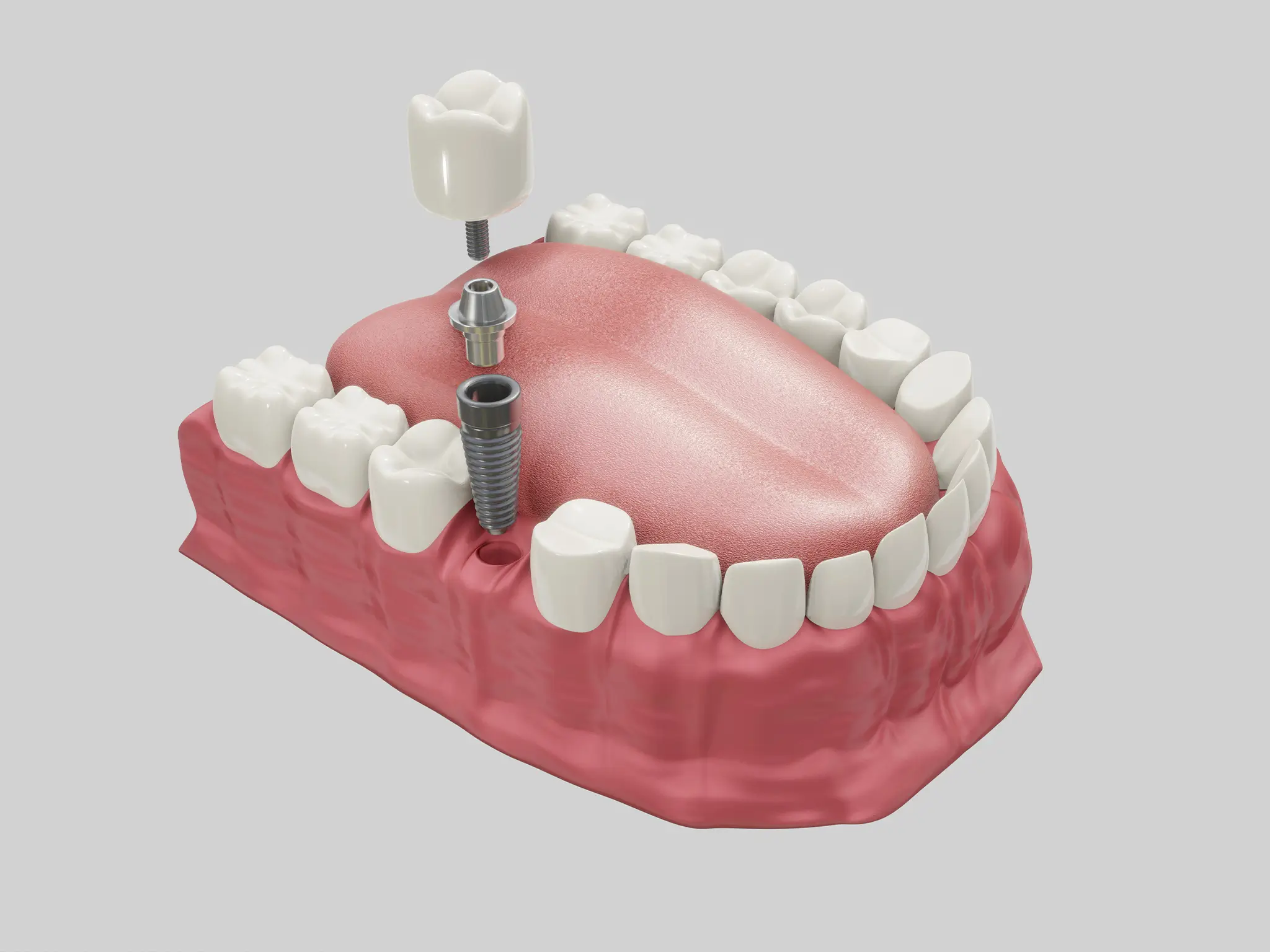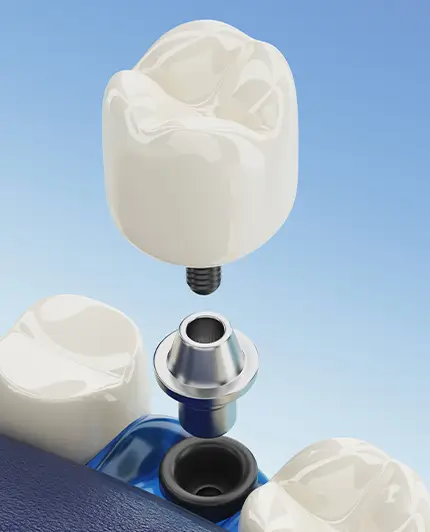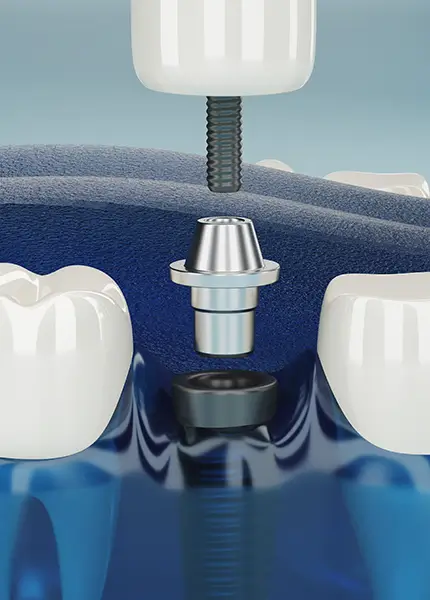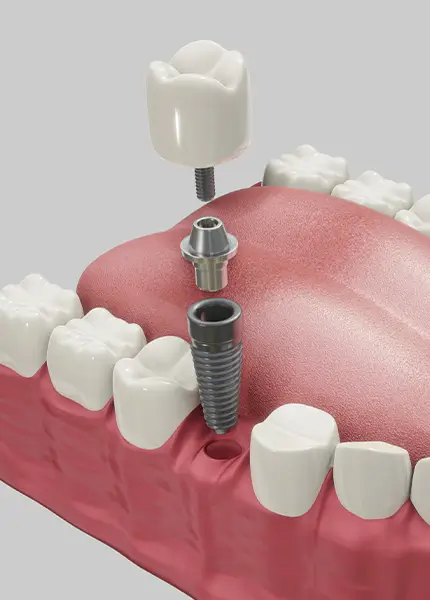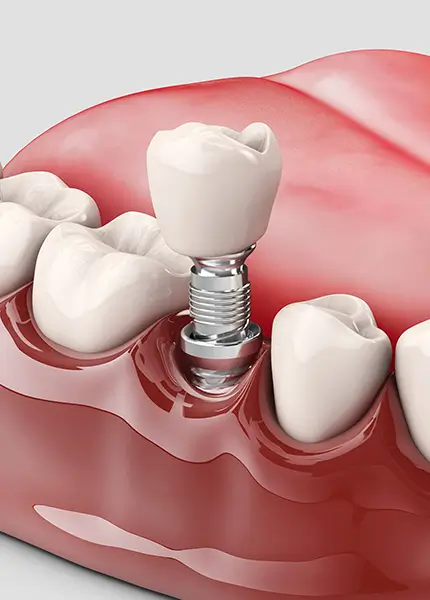Structure of a Single Dental Implant
A single dental implant consists of three key components: the root, abutment, and crown.
The Root - Made of titanium, the root is placed within the jaw bone. The metal fuses with the bone, ensuring a long-term anchor.
The Abutment - The abutment is placed on top of the root and acts as a connecting unit between the crown and root. It is typically made from titanium.
The Crown - The only visible part of the dental implant, the crown comes in a variety of materials to meet different needs and budget ranges. Some crown options for dental implants look more natural than others, depending on your personal preference and why you're getting the treatment.
Advantages of Single Dental Implants
Single dental implants provide a range of benefits, including:
- Preventing bone erosion
- Long-lasting lifespan
- Restoring dental functions
- Correcting speech problems (if present)
- Improving chewing ability
- Enhancing self-image
- Improving overall oral health
Single Dental Implant Procedure
The single dental implant procedure consists of four parts and an additional step (bone grafting) that not all patients require.
General Treatment - Before the procedure, your dentist will examine your mouth and its health, including x-rays to ensure there are no hidden issues.
Bone Grafting (Not Always Necessary) - If you don't have enough bone density to sustain an implant, you may need a bone graft. This involves taking bone tissue from another part of your body and implanting it in your jaw. The graft should fuse with the jaw bone in 4-6 months.
Dental Implant Surgery - During this step, the titanium root is placed into the jaw bone. This procedure typically lasts from 15 minutes to an hour, during which dentists administer local anesthesia to numb the area.
Placing the Abutment - After the jaw bone has healed from the surgery, your dentist will place the abutment on top of the root.
Placing the Crown - You'll start with a temporary crown until a custom-made one is ordered if needed. Your dentist will take impressions of your mouth and send the data to a lab to ensure the perfect crown for you. Our dentists will conduct a rehearsal to ensure that the crowns we prepare are a perfect match for you. Only after this stage will our dentists place your permanent crowns.
Success Rate of Single Dental Implants
The success rate of single dental implants varies depending on several factors, including the skill and reputation of the dental clinic. On average, the success rate is around 98% if everything goes according to plan.
Pain During the Single Dental Implant Procedure
The procedure is performed with local anesthesia, so you shouldn't feel any pain during the procedure. Your dentist may prescribe painkillers to take once the anesthetic wears off.
Caring for Your Single Dental Implant
To ensure the longevity of your single dental implant, it's important to care for it just as you would your natural teeth. Brush twice daily, floss, and use antibacterial mouthwash.
Cost of Single Dental Implant
The cost of single dental implants varies depending on factors such as the country you get the treatment in, dentist fees, the material for the crown, bone loss, the brand of the selected implant, tooth extractions, and the oral health of the patient.
Dental implants are artificial tooth roots that provide a permanent base for fixed or removable replacement teeth. They are surgically placed into the jawbone and fuse with the natural bone to form a secure and stable base for the new teeth.
Turkey is a popular destination for dental treatments, including dental implants, due to the high-quality and affordable dental services available. Estedian, a leading dental service provider in Turkey, offers advanced technology and highly trained professionals to provide top-notch dental care.
Yes, dental implants are designed to look and function like natural teeth. Estedian uses the latest technology and materials to ensure that dental implants blend seamlessly with the patient's existing teeth and smile.
Proper oral hygiene, regular dental check-ups, and avoiding activities that may harm the implants, such as biting on hard objects, are important for maintaining the longevity and function of dental implants. Estedian provides detailed aftercare instructions to ensure the success of the dental implant treatment.

